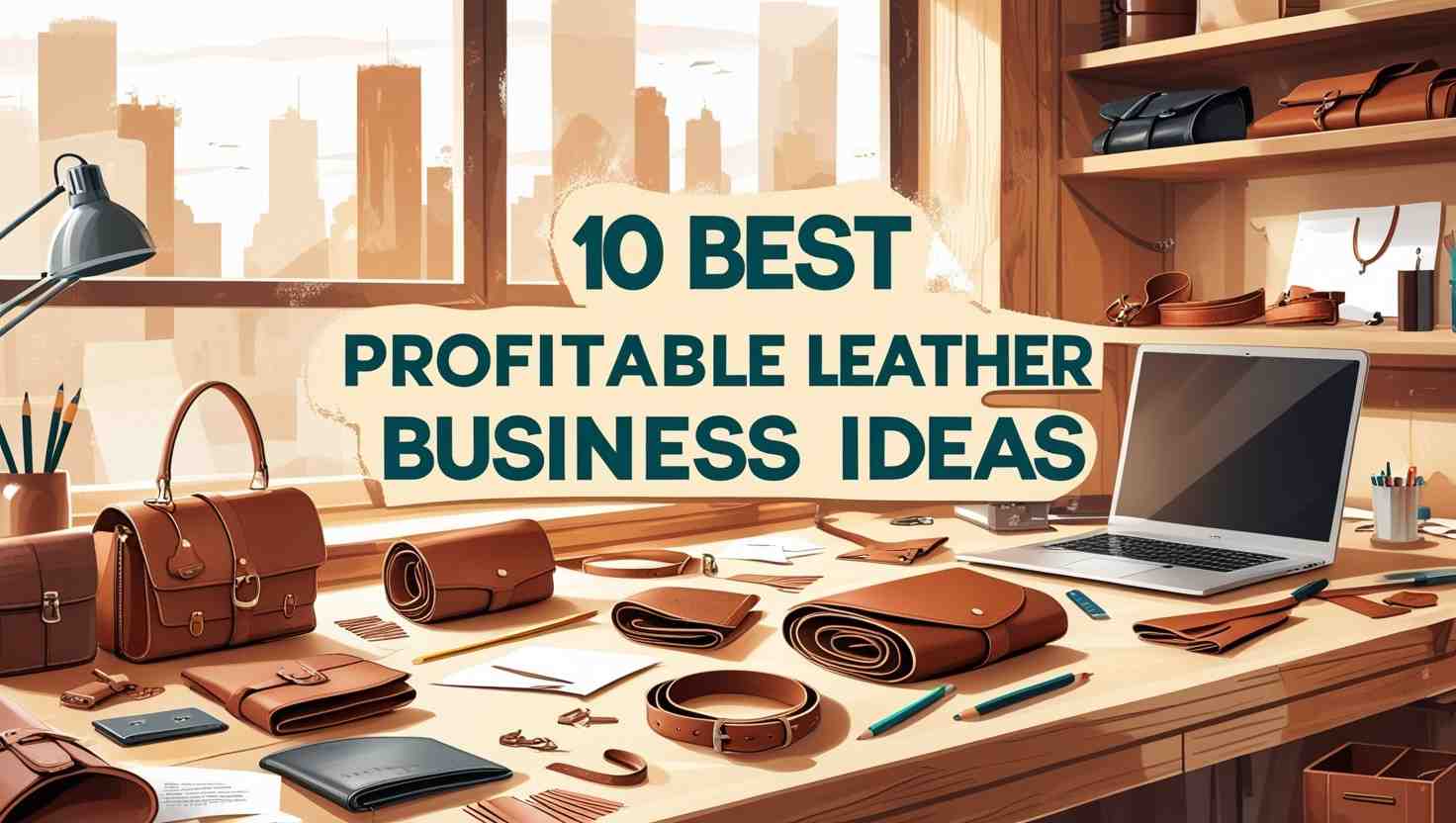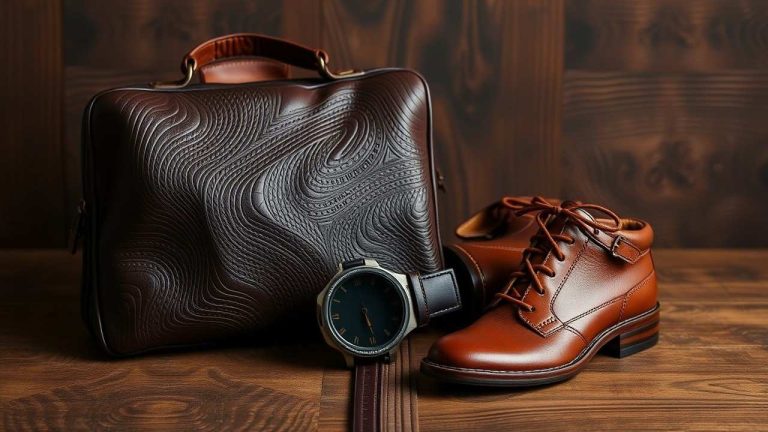1. Leather Accessories Store
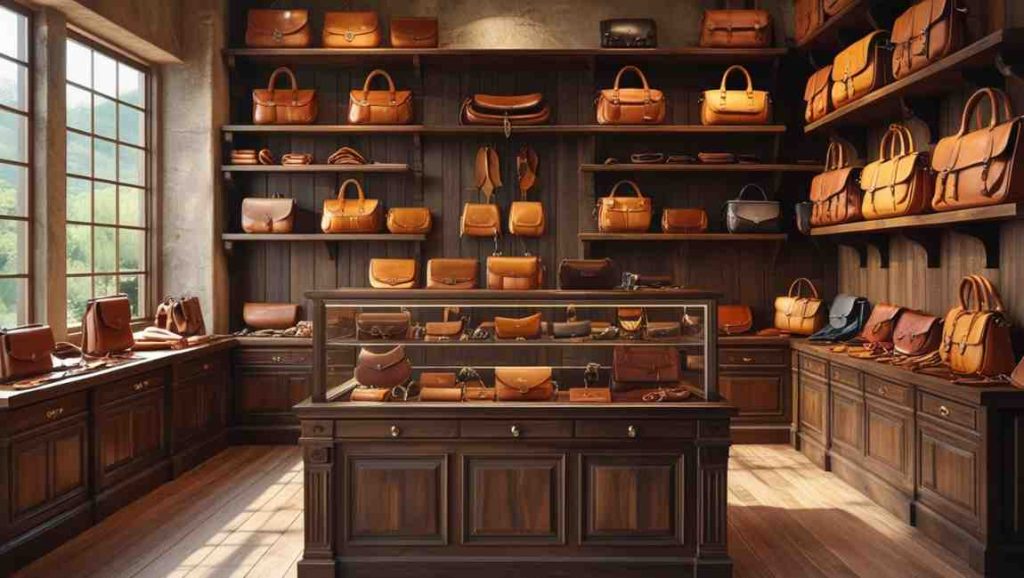
Retail businesses form the backbone of many successful ventures, and leather accessories stores are no exception. From belts and wallets to gloves and phone cases, the demand for leather accessories is evergreen. Consumers are constantly on the lookout for stylish, durable, and practical leather products that can complement their wardrobe or serve as functional items.
By setting up a dedicated store that specializes in leather accessories, you can cater to a wide audience, ranging from fashion-conscious individuals to those in need of high-quality everyday items. Leather accessories have become a staple in many people’s wardrobes, with items such as wallets, bags, belts, and gloves seeing consistent demand. Additionally, you can choose to either open a physical store or explore the world of online retail, which offers lower overhead costs and a broader reach. With the right marketing strategy, a leather accessories store can become a highly profitable business.
2. Leather Export Business
Leather manufacturing is a significant industry in many countries, making leather export a lucrative business opportunity for entrepreneurs in these regions. The global demand for leather products is ever-growing, and many countries that produce leather in bulk—such as India, China, Italy, and the U.S.—are well-positioned to capitalize on this demand.
Starting a leather export business may come with its challenges, including navigating the complexities of international trade regulations, acquiring necessary licenses, and managing the costs associated with shipping and logistics. However, with the right knowledge and resources, the rewards of tapping into global markets can be substantial. You can partner with manufacturers or source leather goods from local artisans, creating a unique portfolio of products that appeal to international buyers. Whether you specialize in exporting raw leather or finished leather products, the export business offers an exciting opportunity to grow your entrepreneurial venture.
3. Leather Jewelry Making
Leather jewelry has grown in popularity, particularly in the fashion world, where people are looking for unique, customizable, and durable accessories. Leather jewelry includes a wide array of products such as keyrings, friendship bracelets, leather chokers, and beaded leather bangles. These products have become popular among people seeking alternatives to traditional metal jewelry.
Starting a leather jewelry-making business offers an excellent opportunity to tap into the market for affordable yet fashionable accessories. Whether you create bracelets, earrings, or necklaces, there is significant potential for creativity and personal expression. With minimal startup costs and the ability to work from home, this is a great business idea for those who have an interest in both leathercraft and fashion. Additionally, you can offer customization options, allowing customers to personalize their pieces, making them even more appealing.
4. Leather Shoe-Making
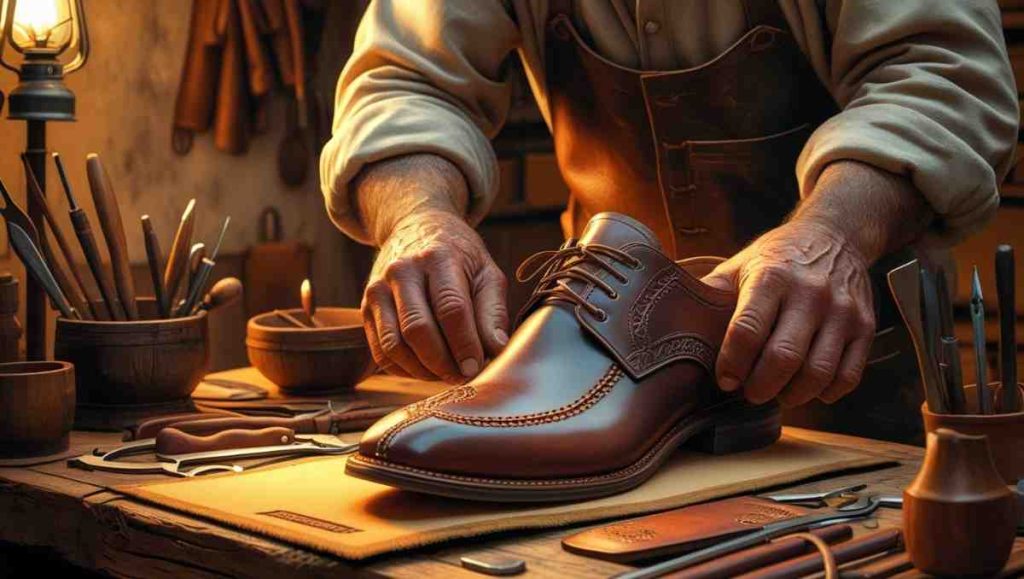
Leather shoes have long been a symbol of quality, sophistication, and craftsmanship. The demand for high-end, well-crafted leather footwear continues to thrive, making the leather shoe-making business a lucrative opportunity for entrepreneurs. While the initial investment in equipment and materials can be significant, the returns can also be substantial, especially if you produce premium leather shoes that cater to niche markets.
The key to success in the leather shoe business is understanding the intricate details involved in crafting high-quality shoes. Consumers are looking for products that offer both style and durability, and building a reputation for excellence is crucial in this competitive industry. With a strong focus on design, attention to detail, and a commitment to quality, leather shoe-making can become a rewarding business. You can also offer custom-made shoes, providing a personalized experience that appeals to customers seeking unique products.
5. Leather Accessories Maintenance
With the growing popularity of leather products, there is an increasing need for leather maintenance services. Leather accessories—such as bags, shoes, belts, and jackets—require regular care and attention to preserve their longevity. Many urban dwellers, particularly those with busy lifestyles, lack the time or knowledge to maintain their leather goods, which opens up an opportunity for entrepreneurs to offer leather care services.
A leather accessories maintenance business could include services like cleaning, conditioning, repairing, and restoring leather products to their original condition. This type of business requires minimal investment, as it primarily involves providing specialized services rather than manufacturing products. By offering high-quality maintenance services, you can build a loyal customer base and tap into a growing demand for leather care. Additionally, you can partner with leather retailers and manufacturers, offering your services as a value-added offering for their customers.
6. Leather Furniture Making
Leather furniture is highly sought after for its durability, elegance, and timeless appeal. From leather sofas and chairs to ottomans and recliners, leather furniture pieces add sophistication to any home or office space. The demand for leather furniture has risen steadily, driven by both homeowners and businesses looking to invest in long-lasting and aesthetically pleasing furniture.
Starting a leather furniture-making business requires a substantial upfront investment in materials and manufacturing equipment. However, the rewards are immense, as leather furniture is considered a premium product that can command higher prices. Additionally, the growing trend of incorporating leather accents into home décor and commercial spaces presents ample opportunities for growth. If you have the skills to craft high-quality leather furniture, this business can be incredibly profitable.
7. Leather Winterwear

Leather jackets, coats, and other winter wear have always been associated with style and sophistication. As the fashion industry continues to evolve, leather winterwear remains a coveted item for consumers worldwide. Leather jackets, particularly those with sleek designs and functional features, are essential items in the wardrobes of fashion-conscious individuals.
By creating a collection of leather winterwear, you can tap into a market that spans various demographics, from young professionals to older consumers who seek both functionality and fashion. The key to success in this business is designing leather wear that is not only stylish but also provides warmth and protection during cold weather. By keeping an eye on emerging fashion trends and offering high-quality products, you can carve out a niche for yourself in the leather winterwear market.
8. Leather Sports Equipment
The sports industry is worth billions, with a growing demand for high-quality sports equipment. Leather has been a staple material in sports gear for decades, with items such as footballs, boxing gloves, baseball gloves, and cleats made from durable and long-lasting leather. As the sports industry continues to grow, the demand for leather sports equipment is expected to increase.
Starting a leather sports equipment business allows you to enter a market with a broad consumer base, ranging from professional athletes to casual sports enthusiasts. By specializing in creating high-quality, durable leather gear, you can cater to a niche market of sports lovers who appreciate the craftsmanship and reliability of leather products. Whether you’re making boxing gloves, footballs, or baseball gloves, the sports equipment market offers significant opportunities for growth.
9. Leather Decorative Sheets
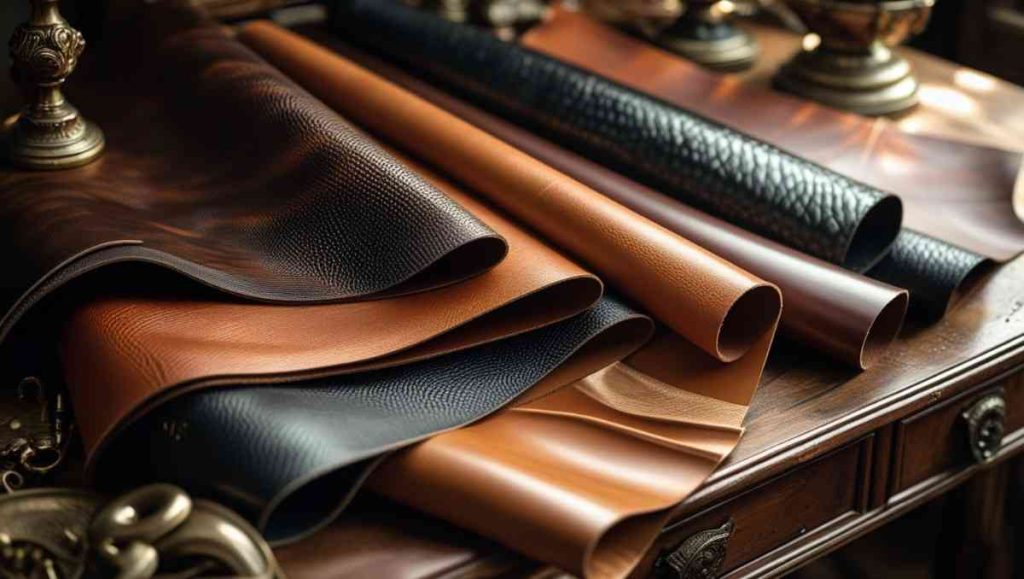
Decorative leather sheets are gaining popularity, particularly in the interior design industry. Leather has been used as a material for creating elegant wall coverings, upholstery, and even decorative accents in homes, offices, and commercial spaces. As more people look for unique and luxurious ways to enhance their interiors, the demand for decorative leather sheets has grown.
Starting a business that specializes in producing and selling decorative leather sheets can be a profitable venture. This business can be particularly appealing to interior designers, architects, and homeowners who want to create distinctive and upscale interiors. By offering high-quality, customizable leather sheets, you can target a growing market that values innovation and luxury.
10. Promotional Leather Products
Promotional products are an essential aspect of modern marketing strategies, and leather products are increasingly being used as premium promotional items. Companies often seek high-end, customized products to gift to clients, partners, and employees, and leather items—such as keychains, wallets, and organizers—are perfect for these purposes.
By starting a business that specializes in creating promotional leather products, you can cater to a wide range of corporate clients looking for branded merchandise. Customized leather products are an excellent way for businesses to make a lasting impression, and with the right marketing and sales strategies, you can build a profitable business that serves this growing demand.
Conclusion
The leather industry is vast and offers numerous opportunities for aspiring entrepreneurs to tap into a profitable and rewarding business. Whether you decide to venture into leather accessories, leather furniture, or sports equipment, each of these niches provides significant potential for growth. By combining passion, craftsmanship, and a keen understanding of market trends, you can build a successful leather business that stands the test of time. Remember, the key to success lies in finding a niche, focusing on quality, and staying attuned to the ever-evolving needs of your customers.
FAQs
1. What are the initial costs involved in starting a leather business?
Starting a leather business can vary in cost depending on the niche you choose. For instance, opening a leather accessories store or starting a leather shoe-making business may require significant initial investments in materials, equipment, and retail space. On the other hand, businesses like leather jewelry-making or leather maintenance services can be started with relatively low costs, as they often require fewer materials and tools. It’s essential to do a thorough market analysis and create a detailed business plan to understand the specific costs for your chosen niche.
2. What skills are necessary to succeed in a leather business?
To succeed in a leather business, certain skills are invaluable. First and foremost, having knowledge of leather crafting and production techniques is crucial. Whether you’re manufacturing leather products or providing services like leather maintenance, understanding the material, its properties, and the craftsmanship involved is key. Additionally, skills in business management, marketing, and customer service will also contribute to your success. If you lack any of these skills, consider training or collaborating with experienced professionals to build a strong foundation for your business.
3. How do I market a leather business effectively?
Effective marketing is crucial for the success of any business, and the leather industry is no exception. For leather businesses, online marketing strategies such as social media promotion, search engine optimization (SEO), and influencer partnerships are highly effective. Platforms like Instagram and Pinterest, which are visual-centric, are ideal for showcasing leather products. Additionally, attending trade shows, building a strong brand identity, and offering quality customer service can help set your business apart from competitors and attract loyal customers.
4. Is the leather industry environmentally friendly?
The leather industry has historically been criticized for its environmental impact, particularly in terms of animal products and the chemicals used in the tanning process. However, there is a growing trend towards more sustainable practices in the leather industry, including using vegetable-tanned leather, adopting eco-friendly dyeing processes, and sourcing leather from ethical suppliers. As an entrepreneur, you can prioritize sustainability by sourcing eco-friendly materials, minimizing waste, and reducing your carbon footprint in production. This approach can also appeal to environmentally conscious consumers.
5. What are the best leather products to focus on for a new business?
The best leather products to focus on largely depend on your target market and interests. For instance, leather accessories like wallets, bags, and belts are always in demand and can be sold to a wide range of consumers. For those interested in fashion, leather jackets and shoes remain timeless products that attract a loyal customer base. Leather goods for specialized markets, such as leather sports equipment or furniture, can also be lucrative. It’s important to research your target audience and industry trends to identify the most profitable and in-demand products within the leather niche.
